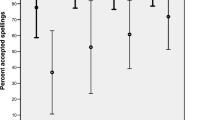Abstract
This paper explores the relationship between speech and spelling in a single-case study of developmental dyslexia. JM, a developmental dyslexic with a well-documented history of speech, reading and spelling difficulties, was examined when he was 13–14 years old. He still had subtle articulation difficulties causing some disfluency and his use of phonetic voicing was atypical. We argue that these difficulties were recapitulated in his spelling where he was more sensitive to the prosodic aspects of words than normal spellers, exhibiting a strong tendency to spell accurately words which are stressed on the first, rather than the second syllable. He also had more difficulty with phonetic voicing and spelling errors reflected this uncertainty. Thus, when word-specific (orthographic) spelling information is unavailable, JM, like all spellers, must make use of phonological spelling strategies. In his case, these are compromised because of underlying phonological speech problems. It is argued that, while young children make use of a phonological ‘frame’ on which to organize orthographic information, dyslexics, like JM, who have inadequate phonological representations, are unable to do so. This has a detrimental effect on their acquisition of spelling.
Similar content being viewed by others
References
Allen, G. D. and Hawkins, S. (1980). Phonological rhythm: definition and development. In G. Yeni-Komshian, J. Kavanagh, C. Ferguson (eds.),Child Phonology: Volume 1 Production. New York: Academic Press.
Bishop, D. V. M. (1985). Spelling in developmental dysarthria: evidence against articulatory coding in translating between phonemes and graphemes.Cognitive Neuropsychology 2: 229–51.
Carramaza, A., Miceli, G. and Villa, G. (1986). The role of the (output) phonological buffer in reading, writing, and repetition.Cognitive Neuropsychology 3: 37–76.
Chiat, S. (1983). WhyMikey's right andmy keys wrong: the significance of stress and word boundaries in a child's output system.Cognition 14: 275–300.
Dodd, B. (1980). The spelling abilities of profoundly prelingually deaf children. In U. Frith (ed.),Cognitive processes in spelling. London: Academic Press.
Ehri, L. (in press). Reconceptualising the development of sight-word reading and its relationship to decoding. In P. Gough (ed.),Reading acquisition. Hove: Erlbaum.
Ellis, A. and Young, A. (1988).Human cognitive neuropsychology. Hove: Erlbaum.
Hulme, C. and Snowling, M. (in press a). Phonological deficits in dyslexia: a ‘sound’ reappraisal of the verbal deficit hypothesis. In N. Singh and I. Beale (eds.),Current perspectives in learning disabilities. New York: Springer Verlag.
Hulme, C. and Snowling, M. (in press b). Deficits in output phonology cause developmental dyslexia?Mind and Language.
Hulme, C. and Snowling, M. (in press c). Deficits in output phonology: an explanation of reading failure.Cognitive Neuropsychology.
Read, C. (1971). Lessons to be learned from the preschool orthographer. In E. H. Lennenberg and E. Lennenberg (eds.),Foundation of Language Development 2. London: Academic Press.
Schonell, F. J. and Schonell, F. E. (1952).Diagnostic and attainment testing. Edinburgh: Oliver and Boyd.
Snowling, M. and Hulme, C. (1989) A longitudinal case study of developmental phonological dyslexia.Cognitive Neuropsychology 6: 379–401.
Snowling, M. and Hulme, C. (in press). Speech processing and learning to spell. In Ellis, W. (eds.),Whole language and phonics. Maryland: Orton Dyslexia Society.
Snowling, M. and Stackhouse, J. (1983). Spelling performance of children with developmental verbal dyspraxia.Developmental Medicine and Child Neurology 25: 430–437.
Snowling, M. J., Stackhouse, J. and Rack, J. P. (1986). Phonological dyslexia and dysgraphia: a developmental analysis.Cognitive Neuropsychology 3: 309–339.
Stackhouse, J. (1982). An investigation of reading and spelling performance in speech disordered children.British Journal of Disorders of Communication 17: 53–60.
Author information
Authors and Affiliations
Rights and permissions
About this article
Cite this article
Snowling, M., Hulme, C., Wells, B. et al. Continuities between speech and spelling in a case of developmental dyslexia. Read Writ 4, 19–31 (1992). https://doi.org/10.1007/BF01027070
Issue Date:
DOI: https://doi.org/10.1007/BF01027070




